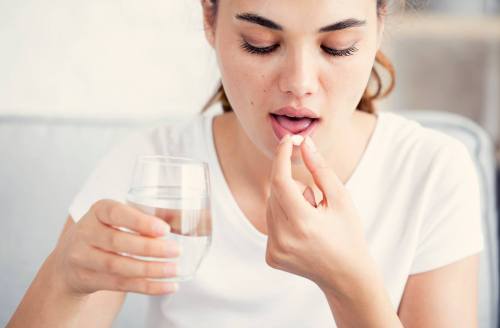Everybody knows that probiotics are a non-negotiable part of any healthy gal’s routine, right? If you’re nodding in agreement, prepare to have your mind blown: A new series of studies published in the journal Cell has prompted people to give this piece of conventional wellness wisdom a second look.
According to news reports, the research found that probiotics may not do as much for us as we think. What’s more, they may actually prevent our microbiomes from coming back into balance after a round of antibiotics.
When I first heard about this, I was just as confused as you probably are. After all, probiotics have long been painted as the antidote to all sorts of gut-health issues—so now we’re supposed to believe they aren’t healthy? To find clarity, I reached out to a few experts and asked them to translate what the heck this research actually discovered, and what it should mean for our day-to-day supplement regimens.
First thing’s first: What did the study actually find?
Essentially, scientists set out to learn what happens in the microbiome when you follow up a course of antibiotics—which are known to zap good gut bacteria—with several treatment options, probiotics included. “The studies involved treating mice and humans with broad-spectrum antibiotics, and then either supplementing them with a generic probiotic to restore beneficial gut bacteria, giving them a fecal transplant, or allowing them to recover on their own over time,” explains Josh Axe, DNM, CNS, DC, and founder of Ancient Nutrition and DrAxe.com.
In mice, the results revealed that an autologous fecal microbiome transplantation (basically, a procedure where the subject’s healthy poo is transplanted back into its system after taking antibiotics) was the most effective way to replenish gut bacteria. Conversely, probiotics actually delayed that same process, and proved to be somewhat inflammatory, says Rabia De Latour, MD, a gastroenterologist at NYU Langone Health. “In humans, they had similar findings, reporting that the generic probiotics were effective at colonizing the gut with beneficial bacteria, but actually delayed the recovery of the gut microbiome,” says Dr. Axe. Yikes.
So what does this mean for your probiotics habit?
According to Dr. Axe and Robin Berzin, MD, CEO of Parsley Health and Well+Good Council member, the research shouldn’t prompt you to abandon ship on your gut-health efforts. “These studies point to the fact that there is still so much more to be learned about the bacteria in our gut,” says Dr. Berzin. “However, what we know today is that gut health is important to overall wellbeing, and it’s essential that we get gut care right.”
Rather, the studies just cement what we already know: One-size-fits-all solutions are rarely effective. “One of the interesting findings of these studies is that generic, over-the-counter (OTC) probiotics may not be effective. This points to something that is true of all supplements: Quality and personalization count,” says Dr. Berzin.
“This points to something that is true of all supplements: Quality and personalization count.”—Robin Berzin, MD
Dr. Axe agrees, pointing at the sheer diversity of your gut bacteria as proof. “The gut microbiome is incredibly complex and hosts trillions of bacterial cells that control everything from immune function to brain health and beyond,” he says. And probiotics should never be considered a cure-all. Rather, they’re just one tool out of many potential digestive helpers. “There are a long list of other factors that impact gut health, including genetics, diet, stress levels, physical activity, and more,” he points out.
Dr. De Latour, on the other hand, is a bit more skeptical about the efficacy of probiotics. “The study is important because it solidifies what a lot of gastroenterologists already thought—that using these [supplements] that essentially have live organisms in them is not recreating the microbiome that we desire, especially in patients that have been on antibiotics,” she explains. Yet she also stresses that because of this study’s specific design, we can’t use it to make definitive assumptions about how probiotics may affect people who haven’t taken antibiotics in a while, or in a few years—or ever.
To keep taking probiotics or not?
To give yourself the best shot at maintaining a healthy microbiome, our experts recommend following a few best practices for taking your gut health into your own hands:
1. Be picky about your probiotics
Dr. Axe posits that generic brands, like the ones used in the study, will often be low-quality to cut costs. That means they’re less likely have a significant impact on your system. Instead, he recommends selecting a product with a high number of colony forming units (CFU) and a mix of bacteria strains to fit your particular needs. “Look for a shelf-stable product with soil-based organisms, as well as supplements that contain live and active cultures to enhance the health benefits of your probiotics even more,” he advises. Dr. Berzin says that any medical-grade probiotic you can get your hands on should be trustworthy.
2. Pair your pill with a gut-friendly diet and exercise
It’s not enough to swill some kombucha, snack on kimchi, and ignore the rest of your diet. “It’s also recommended to follow a nutritious diet filled with healthy whole foods and get in plenty of regular activity to keep your gut microbiome in tip-top shape,” says Dr. Axe. (A Mediterranean diet is a good, science-backed place to start. Oh, and be sure not to skimp on the fiber.)
Bottom line: Taking into account the whole picture of your gut health—rather than relying on a supplement to do all the heavy lifting—is the gold standard we should all be striving for.
Drew Barrymore is all about enzymes when it comes to her gut health—and chai tea may help, too.
Sign Up for Our Daily Newsletter
Get all the latest in wellness, trends, food, fitness, beauty, and more delivered right to your inbox.
Got it, you've been added to our email list.











